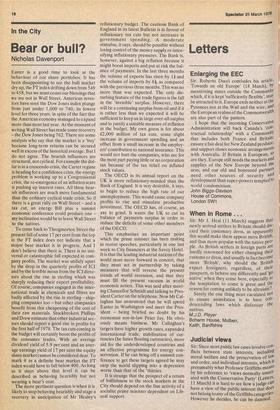In the City
Bear or bull?
Nicholas Davenport
Easter is a good time to look at the behaviour of our share portfolios. It has been disappointing to see the bull macket dry up, the FT index drifting down from 549 to 458, but we must count our blessings that we are not in Wall Street. American investors have seen the Dow Jones index plunge from just under 1,000 to 740, its lowest level for three years, in spite of the fact that the American economy managed to expand more than most last year. At the moment of writing Wall Street has made some recovery —the Dow Jones being 762. There are some analysts who say that the market is a 'buy' because long-term returns can be secured well in excess of the historical average. But! do not agree. The bearish influences are structural, not cyclical. For example the dollar is in a crescendo crisis, the Carter regime is heading for a confidence crisis, the energy problem is working up to a Congressional crisis, the re-emergence of an inflation scare is pushing up interest rates. All these bearish influences are much more fundamental than the ordinary cyclical trade crisis. So if there is a great rally on Wall Street — and a tax cut, an energy Bill plus a summit economic conference could produce one — my inclination would be to leave Wall Street to the natives.
To come back to Throgmorton Street the present fall of some 17 per cent from the top in the FT index does not indicate that a major bear market is in progress. And I don't believe that there is. There is no universal or catastrophic fall expected in company profits. The market was unduly upset by the drop in the quarterly profits of ICI and by the terrible moan from the ICI directors about the rise in sterling which was sharply reducing their export profitability. Of course, companies engaged in the international trade in chemicals and fibres are badly affected by the rise in sterling — shipping companies too — but other companies benefit from this cheapening of the cost of their raw materials. Stockbrokers Phillips and Drew estimate that other industrial sectors should report a good rise in profits for the first half of 1978. The tax cuts coming in the budget will certainly boost the profits of the consumer trades. With an average dividend yield of 5.9 per cent and an average earnings yield of 17 per cent the equity share market cannot be considered dear. To mark it as a definite bear market the FT index would have to fall below 400. As long as it stays above that level it can be described as behaving bearishly but not wearing a bear's coat. The more pertinent question is when it is likely to stop behaving bearishly and stage a recovery in anticipation of Mr Healey's reflationary budget. The cautious Bank of England in its latest Bulletin is in favour of reflationary tax cuts but not increases in government spending. A moderate stimulus, it says, should be possible without losing control of the money supply or inten sifying inflationary pressures. The Bank is, however, against a big reflation because it might boost imports and put at risk the bal ance of payments. In the last three months the volume of exports has risen by 1f and the volume of imports by 811, as compared with the previous three months. This was no more than was expected. The only disturbing feature of the trade figures is the fall in the 'invisible' surplus. However, there will be a continuing surplus from oil and if it is rather less than we expected it will be sufficient to keep us in large over-all surplus and to justify a sizeable measure of reflation in the budget. My own guess is for about £2,000 million of tax cuts, some slight increase in government spending and an offset from a small increase in the employers' contribution to national insurance. This would not hurt the companies, who are for the most part paying little or no corporation tax because of the tax relief on inflated stock values.
The OECD in its annual report on the UK is more reflationary-minded than the Bank of England. It is very desirable, it says, to begin to reduce the high tate of our unemployment. This would cause company profits to rise and stimulate productive investment. The OECD has, of course, an axe to grind. It wants the UK to cut its balance of payments surplus in order to reduce the deficits of some other members of the OECD.
This emphasises an important point which the prime minister has been making in recent speeches, particularly in one last week to City financiers at the Savoy Hotel. It is that the leading industrial nations of the world must move forward in concert, that they must act in partnership by taking measures that will reverse the present trends of world recession, and that they must fill the present vacuum in world economic action. This was said after meeting Chancellor Schmidt and talking to President Carter on the telephone. Now Mr Callaghan has announced that he will spend Easter in Washington and meet the President — being briefed no doubt by his economist son-in-law Peter Jay. He obviously means business. Mr Callaghan's targets have higher growth rates, expanded international trade, stabilisation of currencies (he hates floating currencies), more aid for the underdeveloped countries and an effective programme for energy conservation. If he can bring off a summit conference to get these targets agreed he may stop the world slipping into a depression worse than that of the 'thirties.
It is strange that the prospect of a return of bullishness to the stock markets in the City should depend on the fine activity of a socialist prime minister dependent on Liberal support.


































 Previous page
Previous page